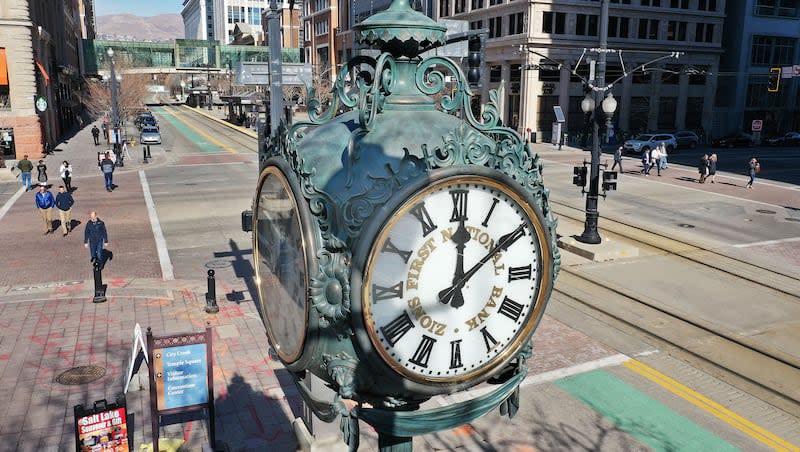Rep. Celeste Maloy wants to let states observe daylight saving time year-round

- Oops!Something went wrong.Please try again later.
- Oops!Something went wrong.Please try again later.
It’s that time of year again: Americans are adjusting to the biannual time change and elected officials are looking to change the way states set their clocks.
Freshman Rep. Celeste Maloy, R-Utah, is among them after she reintroduced the Daylight Act, which would allow states to observe permanent daylight saving time if they choose. Utah is among the nearly 20 states with legislation pending to permanently adopt the “spring forward” time, according to the National Conference of State Legislatures, but Utah’s 2020 law adopting permanent standard time cannot take effect without Congress changing federal law.
Currently, states can opt to observe only standard time — as is the case in Hawaii and most of Arizona — but states are barred from choosing year-round daylight saving time.
“Americans are tired of springing forward and losing sleep and falling back and losing sunlight. Dozens of states, including Utah, have already passed laws to make daylight saving time permanent,” Maloy said. “The federal government needs to get out of the way and allow them to make that choice instead of mandating the needless practice of changing our clocks twice a year.”
Maloy isn’t the first Utah politician to promote the Daylight Act; it was initially introduced by former Rep. Rob Bishop, who represented Utah’s 1st Congressional District from 2003-2021. Bishop, like Maloy, said at the time that the federal government should give more options to states when it comes to setting their time.
“There needs to be a standard time zone; but if you’re giving them an option of one, give them the option of all three,” he told KSL NewsRadio in 2019, referring to standard time, daylight saving time or going back and forth every spring and fall.
Maloy and other proponents of daylight saving time argue extending it would help the economy, as well as boost the physical and mental health of citizens. In a press release, the congresswoman cited studies that found a 27% drop in robberies due to additional daylight in the evenings, slightly lower energy bills and increased spending during daylight saving time.
The biannual time changes have also been linked with increased fatal car crashes, emergency room visits and heart attacks.
Sen. Marco Rubio, R-Florida, has a similar proposal in the Senate, called the Sunshine Protection Act, that would make daylight saving time permanent while allowing states that currently observe year-round standard time to continue doing so, according to The Hill.
Nearly two-thirds of Americans support ending the clock changes, according to a YouGov poll conducted last March, and 50% of those said they would like to adopt permanent daylight saving time, compared to 31% who preferred standard time.
Although daylight saving time appears to be the more popular alternative with the general public, sleep scientists favor permanent standard time, “which aligns best with human circadian biology,” according to a January statement by the American Academy of Sleep Medicine.
“Evidence supports the distinct benefits of standard time for health and safety, while also underscoring the potential harms that result from season time changes to and from daylight saving time,” the statement continues.
As Congress considers federal legislation, at least 30 states have pending legislation dealing with time changes, according to a report earlier this month on the subject by the National Conference of State Legislatures. Part of the reason there has been little movement in either direction is that states often adopt clauses to prevent legislation from taking effect without buy-in from their neighboring states.
For example, Idaho is considering a bill to exempt the state from daylight saving time, but only after any two of its neighboring states or California pass the same exemption.
Many states have dueling pieces of legislation. Indiana is considering a bill to exempt the state from observing daylight saving time and also has introduced a resolution urging Congress to make daylight saving time permanent.

